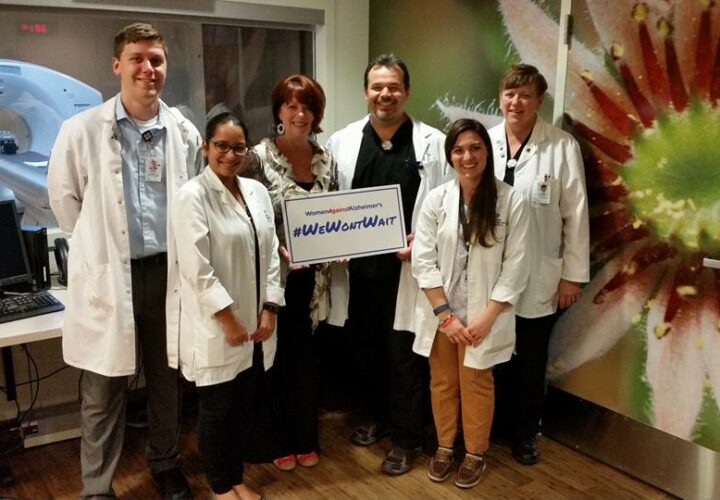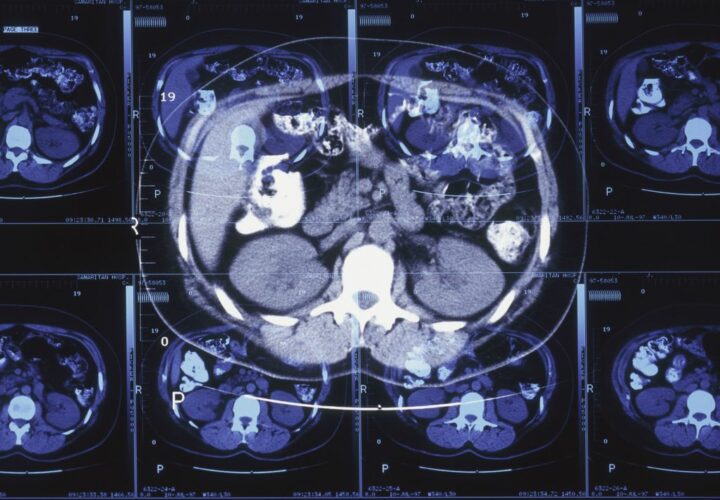A patient who is living with 'the Alzheimer's gene' APOE4 and an Alzheimer's doctor in conversation about genetic testing's benefits and drawbacks.
Posted by Being Patient Alzheimer's on Wednesday, June 12, 2019
Advancements in genetic research now allow people to accurately track their family history and genetic risk factors. But the ubiquity of at-home DNA tests means some people wind up blindsided by potentially traumatic results. While testing herself for multiple sclerosis, Jamie Tyrone was surprised to learn that instead, she has two copies of the ApoE4 gene, increasing her risk of developing Alzheimer’s by 91 percent. While the news initially caused her to experience a deep depression, Tyrone eventually became an Alzheimer’s research advocate, founding a non-profit that raises funds for Alzheimer’s research and participating in clinical trials as a self-proclaimed “lab rat.” Most recently, she co-authored the book Fighting for My Life: How to Thrive in the Shadow of Alzheimer’s with Dr. Marwan Sabbagh, a leading Alzheimer’s researcher and the director of the Cleveland Clinic.
- Tyrone and Dr. Sabbagh talk about the importance of patients being prepared and informed before taking a genetic test
- Sabbagh argues that for those concerned about their genetic predispositions for diseases like dementia, “engagement has to be continuous.” In other words, they should incorporate exercise, a healthy diet and a good night’s sleep into their daily life
Being Patient spoke with Tyrone and Dr. Sabbagh about genetic testing, the potential for further genetic research, what people should know about living with the ApoE4 gene and the lifestyle changes that can influence an individual’s risk.
Genetic Testing for Alzheimer’s and the Ap0E4 Gene
Being Patient: Dr. Sabbagh, you see a lot of patients. When someone has ApoE4 status, what do you say to them?
Dr. Marwan Sabbagh: I am one of the few physicians in the country at the Cleveland Clinic that orders APOE genotyping as part of my medical practice. I do it in a very select group of people, people with symptoms of mild cognitive impairment or dementia, and I do it only in people with Alzheimer’s trajectory. I do not do it in other dementias, and I use it in MCI to predict whether they’re going to progress, predict probability of amyloid pathology—because amyloid pathology correlates very well with APOE status. I use it to predict the likelihood of it worsening over time.
I find it to be a very informative test, and I tell people when I order it that I’m ordering this test due to genetic risk, because of your family history or your age, and then I warn them that this is going to be part of the discussion so there’s no surprise. When I’m discussing it, they’re aware that I’m ordering it, so they’re ready to have that conversation.
Being Patient: Jamie, let’s come to your story now. I know you didn’t think about Alzheimer’s before you got a genetic test, so tell us a little bit about why you got the test, and what happened when you found out.
Jamie Tyrone: So actually, it wasn’t through a test like 23andMe per se, but through the direct consumer experience. I enrolled in a study that was based on the question: “If you knew you had a genetic risk for certain diseases, would you change your lifestyle?” So even though I had Alzheimer’s on both sides of my family, I was in denial. I was 49 years old — it wasn’t even on my radar. Part of the panel of tests they were doing was for ApoE4, so basically there was no genetic counseling, there wasn’t anything at all to help me decide whether I wanted to know this information.
So, one evening at 8:00pm, I’m in front of my computer, and sure enough, staring me in the face was evidence that I had two copies of the ApoE4 allele gene. So what do we do? We go to Google, and all of a sudden, I find that I have a 91 percent risk of getting Alzheimer’s disease, and I was just perplexed and shell-shocked at that point. That’s really how I found out, and it was very difficult and very challenging.
Being Patient: For someone like Jamie who has all of these medical problems, and for other medical professionals who don’t have the experience that you have, what should other doctors look for when you have a patient with such a high risk for Alzheimer’s with a homozygous E4?
Dr. Marwan Sabbagh: I think this is what makes Jamie’s story so unique and compelling, and that’s why I was so excited to work with her on this book. The fact is that doctors are not well-prepared or well-informed and ready to have these conversations. The irony of it all is that if you look at APOE, it’s actually a cardiac test for risk of cardiac disease. I think a lot of cardiologists feel more comfortable looking into ApoE4 than neurologists, and neurologists are not well-prepared to deal with this information.
One of the things that Jamie and I get out of this experience is that we can inform a group of people that really need this information. The general population has 20 percent APOE, but in Alzheimer’s disease, it’s 60 percent, so if you’re in MCI, the probability of progression is high. If you have symptoms, the probability of progression is 26-fold higher than if you don’t, and if you have an ApoE4, the probability that amyloid in your brain is in a symptomatic phase is very high. There are a lot of things the ApoE4 informs us about, and the fundamental difference between ApoE4 and an amyloid PET scan is that the amyloid PET is $5,000, and the ApoE4 is $99. You can actually learn a lot from a simple blood test.
Do You Wish You’d Never Taken the DNA Test?
Being Patient: Jamie, I remember speaking to you a while ago and asking this question: “Knowing what you know now, would you opt to find out your genetic status?” You said “no,” which surprised me, because you’ve become such an amazing advocate. You’re participating in all sorts of trials, and your life purpose has really shifted because of your genetic status. Does that remain true today that you still would rather not know?
Jamie Tyrone: Would I have wanted to know? In retrospect, no. I’ve spent 10 years now with this anxiety, and it’ll always kind of be hanging over my head. Every time I have a sort of brain hiccup or I get confused when I’m driving or something like that, I’m like ugh, it’s Alzheimer’s, but it could very well be attributed to stress. So no, I would not want to know. But on the other hand, I wake up every morning with a purpose, and if I didn’t know this, I wouldn’t be doing this here today. And that in itself is pretty healthy — having a purpose in life. So, to me, this is part of brain health, doing what I’m doing. It keeps me going.
Being Patient: You mentioned that you suffered from post-traumatic stress after the news. What have you learned from this experience?
Jamie Tyrone: I did, and I think a lot of it had to do with the sense of isolation when I first found out. I was counseled not to talk about it for fear of discrimination [by insurance companies], and not knowing where to go with it. Nobody knew what I was going through. I was so isolated. Back then, it wasn’t really talked about. 23andMe had just come out and they were doing testing online, and that’s one of the reasons the book was written.
It’s to help people understand what they’re choosing to do and how to go through the process, so that if they do want to do it, they know that there is a good way to do it. That’s accomplished through education, whether it’s through your physician or a genetic counselor. Genetic testing and counseling has come a long way, which is rather exciting. People are not feeling as isolated because we’re out here now and we’re talking about it, and we’re here to really support each other, so it’s really come a long way in these 10 years.
What You Can Do to Lower Your Alzheimer’s Risk
Being Patient: How much should someone who has a parent with Alzheimer’s be thinking about the possibility that they could develop the disease as well? What is in their control and how should they be living their life?
Dr. Marwan Sabbagh: I know a lot of people would like to reduce this to a soundbite but it’s not. The fact is, I think engagement has to be continuous. You can’t just eat a crappy diet and sit on the couch and then go to Costco and buy the whole roll of supplements and think that’s good enough. It’s not. You have to be physically exercising, eating well, taking the supplements, sleeping right, doing the cognitive stimulation. I think mindfulness of your health and wellness and well-being has to be something always present. You cannot just say, “I’ll wait until later.” I would say to you that it has to become a part of who you are.
Being Patient: Jamie, I love your spirit and the way you’ve turned into a positive what was very traumatic for you. How are you living your life now and what is your intention now that you have all of this information?
Jamie Tyrone: Life’s been very busy, and Dr. Sabbagh probably is too with the book. Right now, I’m just kind of taking each day and am grateful when I wake up and say, “What new things can come?” I actually love new things and challenges, so to me life is exciting. Maybe a year from now, I don’t know. Life is too short, so it’s about how we choose to spend our time. I think, again, staying involved in our communities, staying interactive, finding a purpose, trying to do the best you can with your health, but yet drawing some balance is important. That’s how I’m living my life right now.







One thought on “A Patient and Doctor Weigh the Pros and Cons of Genetic Testing”